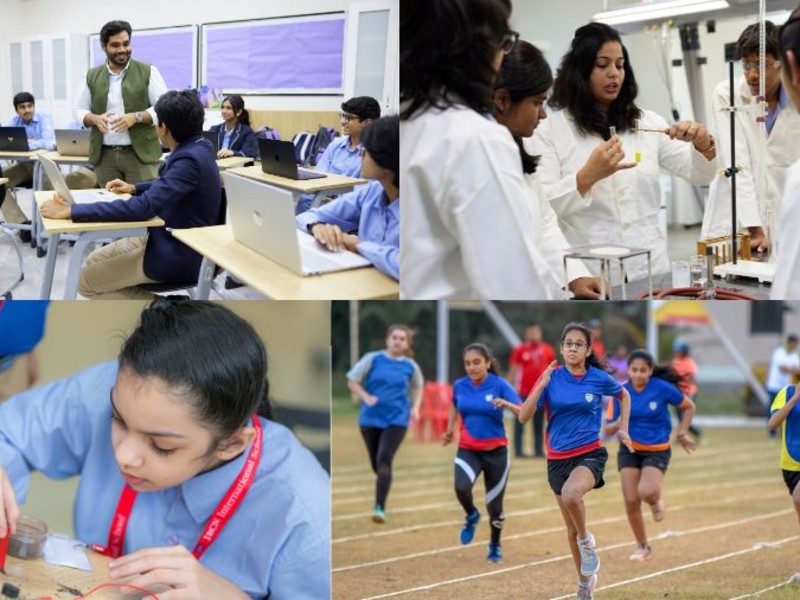– Stephen James Tumpane, JBCN International School, Oshiwara
In today’s fast-paced, globally connected world, education is no longer solely about grades; it’s about cultivating the right mindset for lifelong learning and adaptability. The International Baccalaureate Diploma Programme (IBDP), a globally respected pre-university qualification, stands out as a programme designed not just to educate, but to empower. Yet, despite its growing popularity, the IBDP is still surrounded by myths and misconceptions. Let’s decode the truth, explore the benefits, and understand how this dynamic programme can become a powerful springboard to future success.
What is the IBDP?
The International Baccalaureate Diploma Programme is a two-year educational curriculum for learners aged 16–19. Recognised by leading universities across the globe, the IBDP blends academic depth with a holistic approach to learning. Its structure encourages students to think critically, communicate effectively, and engage meaningfully with both local and global issues.
The programme comprises six subject groups and three core components—Theory of Knowledge (TOK), Extended Essay (EE), and Creativity, Activity, Service (CAS). These elements together nurture intellectual curiosity, independence, and emotional intelligence. IBDP learners tend to transition more smoothly into university life. They are accustomed to independent study, time management, and analytical writing.
Whether a learner dreams of studying at an Ivy League college, pursuing liberal arts in Europe, entering India’s design schools, or becoming a researcher, entrepreneur, or social impact leader—the IBDP lays a strong foundation.
The programme’s international recognition opens doors across countries. Its emphasis on global contexts, intercultural understanding, and ethical decision-making aligns perfectly with what employers and universities seek: adaptable, thoughtful, and proactive individuals.
Moreover, the IBDP builds a learner profile that goes beyond transcripts: one that demonstrates resilience, initiative, and a readiness to engage with complex challenges—qualities that are prized in today’s ever-evolving workforce.
Breaking the Myths
Despite its transformative potential, the IBDP is often misunderstood. Let’s look at a few common myths:
1. It’s not accepted in Indian universities
While international universities widely recognise the IBDP, since 1983 International Baccalaureate Diploma Program has been recognized by the Association of Indian Universities as an entry qualification to all universities in India.
2. It doesn’t prepare students for competitive exams
The IB curriculum focuses on shaping well-rounded individuals by building strong foundational skills essential for thriving in today’s fast-changing, interconnected world. It helps learners develop critical thinking, effective communication, creativity in problem-solving, and the ability to collaborate—skills that are valuable across various careers and life paths.
On the other hand, competitive exams in India like JEE and NEET demand a different set of strengths such as speed, accuracy, time management, and subject mastery under pressure. While both systems aim for excellence, they do so in distinct ways. IB learners, with their global outlook and strong analytical skills, can successfully navigate these examinations when guided with the right strategies and support.
3. It’s too stressful and intense
Any rigorous programme requires time management and commitment, but the IBDP emphasises balance. The IBDP cultivates essential work ethics in learners, equipping them for life beyond just examinations. Its emphasis on holistic development, especially through the CAS (Creativity, Activity, Service) component which helps strike a healthy balance between academic rigor and personal growth.
4. It’s only for academic geniuses
The IBDP is rigorous, yes—but it is also inclusive. It is designed to support a range of learning styles and strengths. Learners who are disciplined, curious, and open to growth thrive in this environment. The IBDP places a greater emphasis on holistic education rather than solely focusing on grades.
To conclude, the International Baccalaureate Diploma Programme is more than an academic qualification—it’s a mindset shift. It encourages learners to be thinkers, doers, and Changemakers. It breaks the mould of traditional education by embracing inquiry, innovation, and individuality. If nurtured with the right guidance and mindset, the IBDP can open pathways to not only holistic learning, but also a purposeful and impactful life.
Also read: JBCN Education: Promoting internationalism in education through a global curriculum
